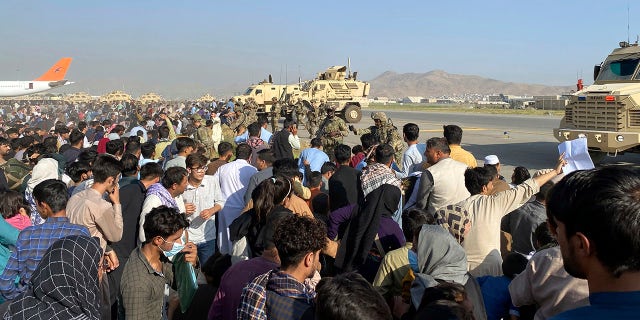Afghan refugees adapt to life in America, one year after chaotic withdrawal of US troops
This article is part of a Fox News Digital series examining the consequences of the U.S. military withdrawal from Afghanistan one year ago this week.
In August 2021, the world watched with dismay as the United States, after a nearly 20-year occupation of Afghanistan, chaotically withdrew its forces and enabled the Taliban to quickly reclaim control of the war-torn country.
One year later, many Afghans who – despite the odds – fled their homeland have learned to adapt to a new life in the United States.
One of those refugees is Hamid Wahedy, 36, who worked with U.S. troops for six years as an IT specialist, providing internet service.
With a wife and two kids – and another on the way – he is now living and working in New Hampshire in a small community of 100 to 120 fellow Afghans.
GRAHAM WARNS BIDEN'S BOTCHED AFGHANISTAN WITHDRAWAL IS ‘SETTING UP ANOTHER 9/11’: ‘WE’RE NOT PREPARED'
"I’m feeling happy that I’m here. My family is able to walk everywhere in peace without any issues. My kids are able to go to school, and they will study well," Wahedy said.
As much as he would like to go back, Wahedy knows that he would not be safe and worries about the future of his country.
"The future of Afghanistan is not good. The dark years are coming. I’m not hopeful. (The Taliban) are not the ones who are running Afghanistan peacefully," Wahedy said.
Another Afghan, Helal Massomi, was evacuated to the U.S. after Kabul fell to the Taliban – a memory she described as "the worst experience" of her life. Because of her activism and high profile in Afghanistan, she knew that put her at risk.
FALLEN SOLDIER AND DEVOTED FATHER LOST IN AFGHANISTAN LEFT LEGACY OF TRUE FRIENDSHIP
Massomi eventually settled in Washington, D.C., after obtaining a humanitarian parole visa, which is used on a case-by-case basis for "urgent humanitarian or significant public benefit." She applied for asylum and a work permit – a process that took nearly nine months to get sorted.
"No one was willing to give me a job and no one would trust me," Massomi said.
Earlier this month, a bipartisan coalition of lawmakers in the House and Senate introduced the Afghan Adjustment Act, a bill that would give a pathway to citizenship to the tens of thousands of Afghan evacuees.
The legislation would allow Afghans with temporary humanitarian status to apply for permanent legal residency in the United States – rather than through the asylum system or Special Immigrant Visa (SIV) process. The bill would also broaden eligibility for the SIV visa, which is designated for allies who aided the American military operation in the country.
 U.S soldiers stand guard along a perimeter at the international airport in Kabul, Afghanistan, Monday, Aug. 16, 2021. (AP Photo/Shekib Rahmani)
U.S soldiers stand guard along a perimeter at the international airport in Kabul, Afghanistan, Monday, Aug. 16, 2021. (AP Photo/Shekib Rahmani)